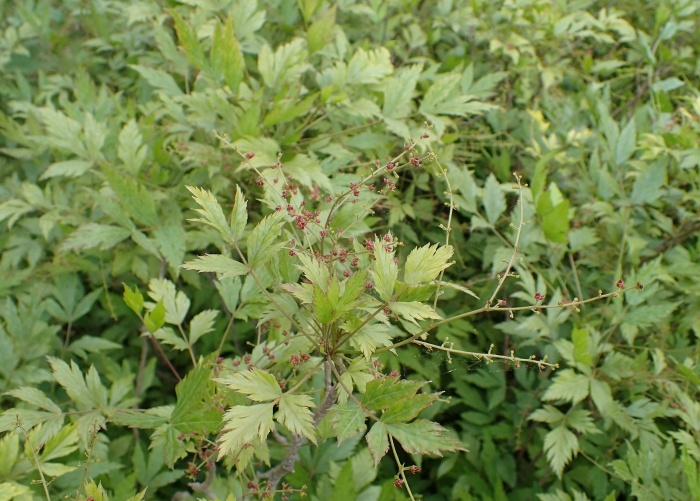Yellowroot
(Xanthorhiza simplicissima)
Yellowroot (Xanthorhiza simplicissima)
/
/

Krzysztof Ziarnek, Kenraiz
CC BY-SA 4.0
Image By:
Krzysztof Ziarnek, Kenraiz
Recorded By:
Copyright:
CC BY-SA 4.0
Copyright Notice:
Photo by: Krzysztof Ziarnek, Kenraiz | License Type: CC BY-SA 4.0 | License URL: https://creativecommons.org/licenses/by-sa/4.0 | Uploader: Kenraiz | Publisher: Wikimedia Commons | Title: Xanthorhiza_simplicissima_kz04.jpg | Notes: Transferred from Flickr via #flickr2commons |










































































Estimated Native Range
Summary
Xanthorhiza simplicissima, commonly known as Yellowroot, is a deciduous perennial subshrub or herb native to stream banks and moist woods in the Southeastern United States. It typically reaches 20–70 centimeters (8–28 inches) in height, with slender stems up to 6 millimeters (0.24 inches) in diameter. The plant features compound leaves with toothed leaflets and a distinctive yellow coloration to the roots. Flowers emerge in early spring from the upper portion of the unbranched stem, forming broad panicles 6–20 centimeters (2–8 inches) long. Each small, star-shaped flower is reddish-brown to purple-brown, with five petals, and while not overly showy, they add a subtle charm to woodland gardens during their bloom period.
Yellowroot is valued for its ornamental foliage, particularly in the fall when the leaves turn a striking yellow to golden-brown. It is used as a hardy deciduous ground cover and is also appreciated for its medicinal properties, as the roots contain berberine, which has been used traditionally to treat a variety of ailments. Yellowroot thrives in partial to full shade, requiring medium to high amounts of water, and prefers well-drained soils with rich organic matter. While it is generally low-maintenance, it can spread through rhizomes and may need to be controlled in smaller garden settings.CC BY-SA 4.0
Yellowroot is valued for its ornamental foliage, particularly in the fall when the leaves turn a striking yellow to golden-brown. It is used as a hardy deciduous ground cover and is also appreciated for its medicinal properties, as the roots contain berberine, which has been used traditionally to treat a variety of ailments. Yellowroot thrives in partial to full shade, requiring medium to high amounts of water, and prefers well-drained soils with rich organic matter. While it is generally low-maintenance, it can spread through rhizomes and may need to be controlled in smaller garden settings.CC BY-SA 4.0
Plant Description
- Plant Type: Subshrub, Herb
- Height: 0.5-2.5 feet
- Width: 6-9 feet
- Growth Rate: Rapid
- Flower Color: N/A
- Flowering Season: Spring
- Leaf Retention: Deciduous
Growth Requirements
- Sun: Full Sun, Part Shade
- Water: Medium, High
- Drainage: Medium
Common Uses
Bank Stabilization, Bird Garden, Deer Resistant, Drought Tolerant, Erosion Control, Groundcover, Low Maintenance, Water Garden
Natural Habitat
Stream banks and moist woods in the Southeastern United States
Other Names
Common Names:
Scientific Names: , Xanthorhiza simplicissima, Xanthorhiza apiifolia, Actaea xanthorrhiza, Xanthorhiza apiifolia var. ternata, Xanthorhiza tinctoria,
GBIF Accepted Name: Xanthorhiza simplicissima Marshall